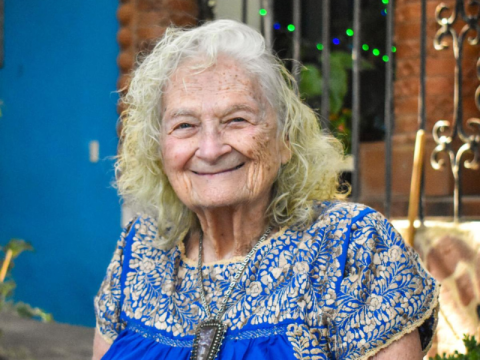Dr. Gwendolyn Midlo Hall (NC ’49)

Contributions
A New Orleans native, renowned historian Gwendolyn Midlo Hall revolutionized teaching about slavery in Louisiana by applying computer technology to information she unearthed in archives and courthouse records throughout the state.
In 1949, Hall graduated from Newcomb College, where she studied European and American History. While pursuing her education, she participated in and helped organize direct-action community groups, including the New Orleans Youth Council, Young Progressives, Civil Rights Congress, and the Southern Council for Human Welfare, whose interracial membership roster defied the status quo of the Jim Crow South.
After completing her undergraduate studies, Hall earned bachelor’s and master’s degrees from the Universidad Nacional de México. She taught briefly at Elizabeth City State College in North Carolina, until her attempts to organize students against the KKK and American military intervention in Vietnam resulted in an investigation from the Federal Bureau of Investigation and her dismissal. In 1966, despite her inclusion on the FBI’s blacklist, Hall enrolled in the University of Michigan’s doctoral program in Latin American history and completed her PhD in 1970. Her first book, Social Control in Slave Plantation Societies: A Comparison of St. Domingue and Cuba, was published by Johns Hopkins University Press in 1971. The same year, Hall joined the faculty of Rutgers University, where she would remain for 25 years.
During her career, Hall published numerous books and academic resources, most notably Africans in Colonial Louisiana: The Development of Afro-Creole Culture in the Eighteenth Century, which was published in 1992 by Louisiana State University Press. This work was the culmination of a decade of research into archival findings from Louisiana court, census, sacramental, and notarial records to create a database dedicated to recovering the identities of enslaved individuals. The book won numerous national awards, including the American Studies Association’s John Hope Franklin Prize and has become a canonical work for students and scholars of African, American, Atlantic, Caribbean, and Latin American history. Throughout the 1990s, Hall continued to add to the database, utilizing a research grant from the National Endowment for the Humanities, the Louisiana Endowment for the Humanities, University of New Orleans, and The Historic New Orleans Collection. In 2000, she released the first version of what would become the Louisiana Slave Database, a searchable collection of more than one hundred thousand records tied to enslaved individuals and free people of color.
Hall published her final book, a memoir entitled Haunted by Slavery: A Southern White Woman in the Freedom Struggle, in 2021 and passed away in 2022 at the age of 98. In 2023, Tulane University announced spaces within Hébert Hall, an academic building on the Uptown campus, would be named in honor of Hall, renowned historian, and the Desegregation Trailblazers, the first students that integrated Tulane in 1963.
